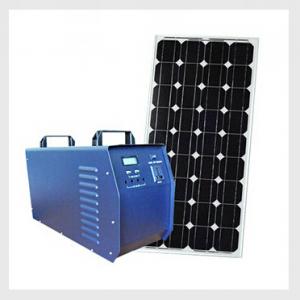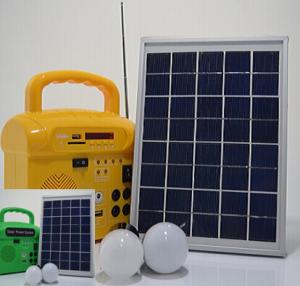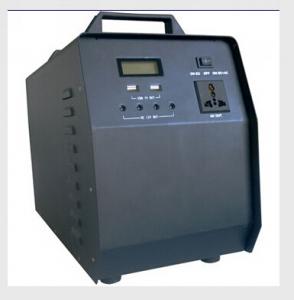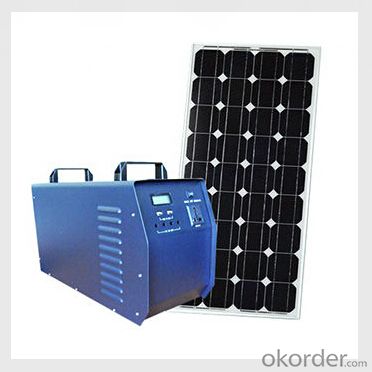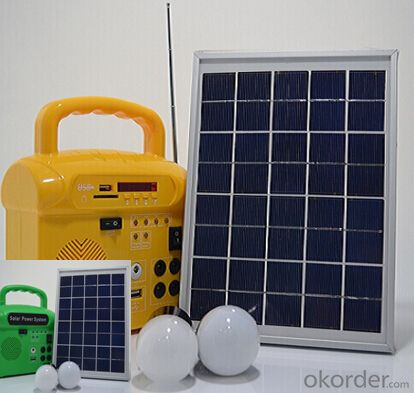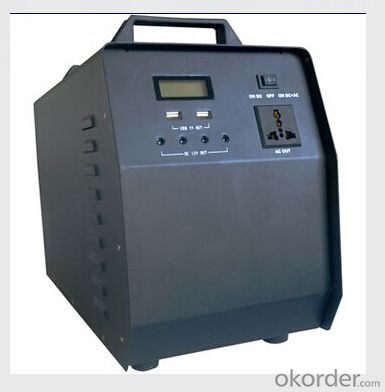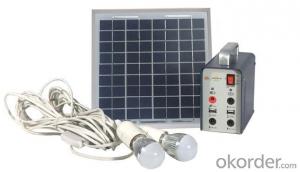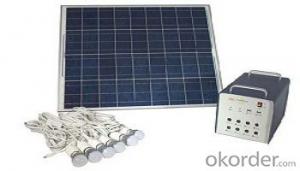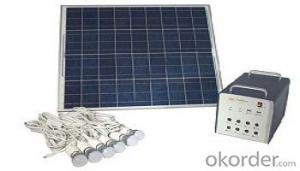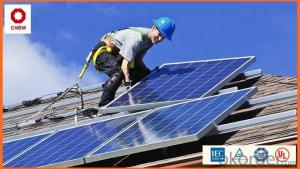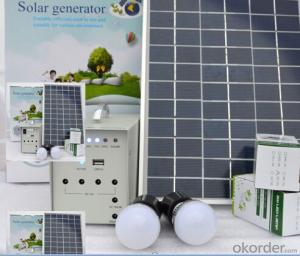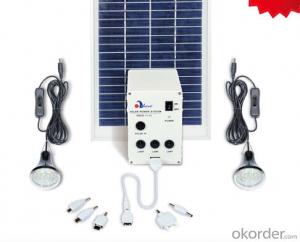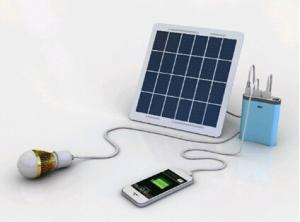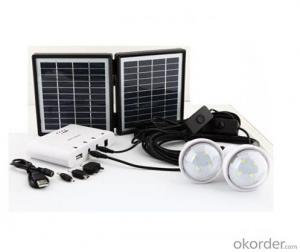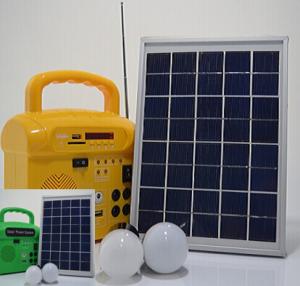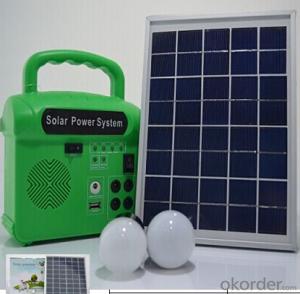Solar Energy Systems Gold Coast - CNBM Solar Home System Roof System Capacity-5w-1
- Loading Port:
- China Main Port
- Payment Terms:
- TT or LC
- Min Order Qty:
- 500 set
- Supply Capability:
- 10000 set/month
OKorder Service Pledge
OKorder Financial Service
You Might Also Like
Introduction of Solar Home System
A home solar power system is a great way to save money by reducing or even eliminating your electricity bill. In recent times the price and cost of installing a home solar power system in Australia has continued to fall, this is mostly due to an increase in demand, more efficient solar panel manufacturing techniques and advances in solar cell technology. As the price of fossil fuel generated electricity continues to rise, many more Australian homes are making the solar switch over and enjoying the true value solar energy can provide.
It is very good for indoor use where there is shortage of electricity and for outdoor activities such as picnicking, fishing and camping. It is an ideal tool for Motor Mechanics, Farm House and small shop owners such as Hairdressers, Barbers, Cobblers, Tailors and Kiosk keepers.

Working Principle of Solar Roof System
The stand alone Solar Home System is an off-grid solar system which uses batteries to store the solar energy. Stand alone solar system solutions design for those who are not able or willing to connect to electricity grid.
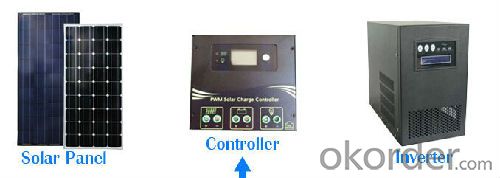
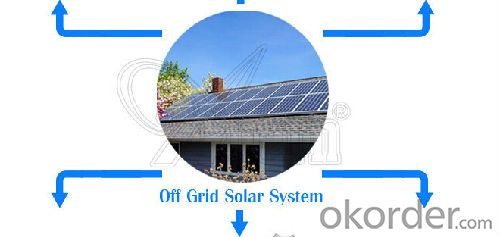

Specification of Solar Home System
Solar panel : 18V, 5W
Rechargeable battery: lead acid,12V,4Ah,maintenance-free
Lamp:led lamp, DC 12V, 20LED(1W) per lamp,lamp holder ,total 2pcs
Wire lead : 5m with DC connector
Function: over charge/discharge protection/short circuit protection
Lighting mode: constantly
Charging time: 6-8hours
Output voltage: DC 5V,DC12V,
Qutantity of carton: 3pc
Carton size: 36.5*30.5*575px
Product Features of Solar Home System
Off grid solar power system is mainly used for application with relatively-small power consumption, and the areas have no grid network coverage, or grid power is unstable or outage condition.
It’s composed of solar panels, hybrid solar inverter, battery bank, solar panel mounting racks, and other accessories required fora complete home solar power system.
The battery bank gives a stable power output to the solar inverter which converts DC to AC to power loads, and provides power backup in rainy or cloudy days.
The solar panels generate electricity at daytime and charge the battery bank.
The off grid home solar power system provides grid power bypass in case of battery power shortage when sunshine is not enough.
All the off grid home solar power system configurations are worked out by scientific calculation and design.
Advantage of Our Solar Home System
1.Safety and easy installation,Plug and play systems;
2.Good quality panel to ensure the high efficiency and long life needs;
3.Solar Automatic lighting controller :with adjustable run times, over-current protection;
4.Solar Batteries: Maintenance free, long life batteries
5.Lighting Source: LED lamp /Lantern (Fixed/Movable)
6.Flexible designs per client requests;
Terms and Conditions
1. Trade terms: FOB Shanghai
2. Payment terms: 30% T/T, balanced before shipment/ LC at sight before shipment. Actual Terms can be negotiated for big order.
3. Package: Exported standard package suitable for tough handling and sea transport.
4. Delivery: Goods to be ready within 10~30 days depending on order quantity.
5. Warranty: 10 years for solar panel, 2 years for controller/inverter/battery.
FAQ
Q: Could you introduce the background of your company?
A: We are a Group corp. with 1GW capacity in China, which is Okorder’s registered VIP Supplier, possess Financial Service from Okorder.com.
Q: Required mainly certificates (CE&IEC/TUV/RoHS)?
A: Our products are certificated by CE RoHS, IEC, ISO, TUV, UL etc.
Q: Your main exported market is?
A: Main markets of our products is: South-east Asia, Mid-east, Arica, East Europe and Latin America.
- Q: Can solar energy systems be used for heating and cooling?
- Yes, solar energy systems can be used for heating and cooling. Solar thermal systems can be used to harness the sun's energy to heat water or air, which can then be used for space heating or water heating. Additionally, solar-powered air conditioning systems exist that utilize solar energy to cool indoor spaces.
- Q: How does the installation of solar panels affect the building's resale value?
- Installing solar panels can positively impact a building's resale value. Potential buyers are increasingly interested in energy-efficient features, and solar panels can significantly reduce electricity costs. Additionally, solar panels demonstrate a commitment to sustainability, which appeals to environmentally conscious buyers. Overall, the installation of solar panels can make a building more attractive, potentially leading to a higher resale value.
- Q: Can solar energy systems be installed on multi-story buildings?
- Yes, solar energy systems can be installed on multi-story buildings. In fact, many multi-story buildings have successfully implemented solar panels on their rooftops or façades to harness solar energy and generate electricity.
- Q: How do solar energy systems impact renewable energy targets?
- Solar energy systems have a significant positive impact on renewable energy targets. These systems harness the power of sunlight, a virtually unlimited and clean energy source, to generate electricity. By increasing the share of solar power in the energy mix, they help reduce dependence on fossil fuels, lower carbon emissions, and contribute to a more sustainable energy future. Furthermore, solar energy systems play a crucial role in diversifying the renewable energy portfolio, enhancing energy security, and promoting the achievement of renewable energy targets at a faster pace.
- Q: How do solar energy systems impact the reduction of fossil fuel consumption?
- Solar energy systems have a significant impact on the reduction of fossil fuel consumption as they provide a renewable and clean source of energy. By harnessing the power of the sun, these systems generate electricity without burning fossil fuels, thereby decreasing our reliance on non-renewable resources. Switching to solar energy helps decrease carbon emissions, mitigating climate change, and promoting a sustainable future.
- Q: Can solar energy systems be used for powering electric car wash systems?
- Solar energy systems have the capability to operate electric car wash systems. Utilizing photovoltaic panels, solar energy systems convert sunlight into usable electricity. This electricity can then be employed to power a variety of electrical devices, such as car wash systems. By strategically placing solar panels on the roof of a car wash facility or a nearby structure, the generated solar power can be directly harnessed to operate the electric motors, pumps, and other necessary equipment for a car wash system. This not only diminishes the dependence on traditional grid electricity but also aids in reducing operational expenses and minimizing the carbon footprint of the car wash facility. Moreover, solar energy systems have the ability to store surplus energy in batteries, ensuring uninterrupted operation even during periods of limited sunlight or at night.
- Q: Can solar energy systems be used for powering electric vehicle charging pads?
- Yes, solar energy systems can be used to power electric vehicle charging pads. Solar panels can be installed near the charging pads to capture sunlight and convert it into electricity, which can then be used to charge electric vehicles. This allows for sustainable and renewable energy sources to be utilized for electric vehicle charging.
- Q: Can a solar energy system be integrated with energy storage systems?
- Indeed, the integration of energy storage systems with solar energy systems is possible. This integration is gaining popularity and significance within the renewable energy industry. Energy storage systems, like batteries, offer the capability to store surplus energy produced by solar panels for later use, especially during times of low solar radiation or high energy demand. Consequently, this effectively addresses the intermittent nature of solar energy generation and ensures a consistent and reliable power supply. Combining solar energy systems with energy storage allows users to decrease their dependence on the traditional power grid, increase the consumption of solar energy, and even attain complete energy independence in certain cases. Furthermore, this integration plays a vital role in advancing sustainable and resilient energy systems. It facilitates the integration of renewable energy sources into the power grid and smoothens out fluctuations in energy supply and demand.
- Q: How often do solar panels need to be cleaned?
- Solar panels typically need to be cleaned at least once or twice a year to maintain their efficiency. However, the frequency of cleaning can vary depending on various factors such as the location, climate, and surrounding environment.
- Q: Can solar energy systems be used in areas with limited roof space due to chimneys or vents?
- Yes, solar energy systems can still be used in areas with limited roof space due to chimneys or vents. While it is true that solar panels typically require a certain amount of unobstructed roof space for optimal efficiency, there are alternative solutions available for areas with limited roof space. One option is to install solar panels on flat or sloped surfaces adjacent to the roof, such as on the ground or on a nearby wall. These ground-mounted or wall-mounted solar systems can be adjusted to maximize exposure to sunlight, ensuring that the panels still generate a significant amount of energy. Another solution is to use solar technologies that are specifically designed for limited roof space. For example, there are solar tiles available that can be integrated into the roof itself, replacing traditional roofing materials while still harnessing solar energy. These solar tiles can be installed around chimneys, vents, or any other obstructions on the roof, making efficient use of the available space. Additionally, solar energy systems can also be combined with other renewable energy sources, such as wind turbines or geothermal systems, to compensate for the limited roof space. By diversifying the renewable energy sources, it is possible to meet the energy needs of an area even with limited roof space. In conclusion, while limited roof space due to chimneys or vents may pose some challenges, there are still viable options for utilizing solar energy systems. By exploring alternative mounting options, using solar tiles, or combining solar with other renewable energy sources, it is possible to harness solar power in areas with limited roof space.
Send your message to us
Solar Energy Systems Gold Coast - CNBM Solar Home System Roof System Capacity-5w-1
- Loading Port:
- China Main Port
- Payment Terms:
- TT or LC
- Min Order Qty:
- 500 set
- Supply Capability:
- 10000 set/month
OKorder Service Pledge
OKorder Financial Service
Similar products
Hot products
Hot Searches
Related keywords
